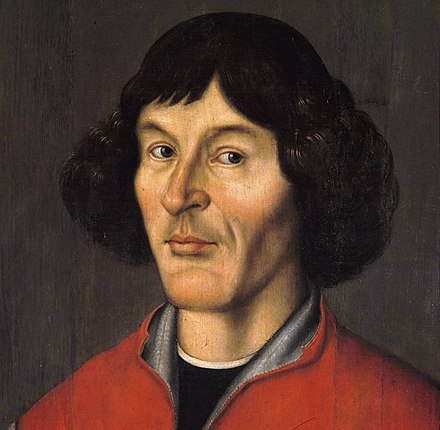Quoting from my dad's old college General Physics book written
in the early 1900s, "What we may properly call the birth of
modern physics, however, dates from Galileo (1564-1642), one
of the most remarkable men who ever lived. More than any one
of his predecessors or contemporaries he introduced
'controlled experiment' as a means of gaining knowledge of
nature".
Similarly Johannes Kepler (1571-1630) discovered his laws of
planetary motion and is widely acknowledged as the "Father of
Modern Physics" for his use of observational data (mostly
Brahe's) and the application of mathematical modeling to
astronomical data.
Tycho Brahe's contributions to astronomy were enormous. He
not only designed and built instruments, he also calibrated
them and checked their accuracy periodically. He thus
revolutionized astronomical instrumentation. He also changed
observational practice profoundly.
 Copernicus (1473-1543)
|
|
___________________________________________________
Tycho Brahe Johannas Kepler Galileo Galilei
(1546-1601) (1571-1630) (1564-1642)
On the Shoulders of Giants
Edited with Comentary, by Stephen Hawking
Running Press, September 2002
ISBN-13: 9780762413485
ISBN-10: 0762413484
https://www.amazon.ca/Shoulders-Giants-Stephen-Hawking/dp/076241698X
World-renowned physicist and bestselling author Stephen
Hawking presents a revolutionary look at the momentous
discoveries that changed our perception of the world with
this first-ever compilation of seven classic works on
physics and astronomy. His choice of landmark writings by
some of the world's great thinkers traces the brilliant
evolution of modern science and shows how each figure built
upon the genius of his predecessors. On the Shoulders of
Giants includes, in their entirety, On the Revolution of
Heavenly Spheres by Nicolaus Copernicus; Principia by Sir
Isaac Newton; The Principle of Relativity by Albert
Einstein; Dialogues Concerning Two Sciences by Galileo
Galilei with Alfonso De Salvio; plus Mystery of the Cosmos,
Harmony of the World, and Rudolphine Tables by Johannes
Kepler. It also includes five critical essays and a
biography of each featured physicist, written by Hawking
himself.
sam.wormley@icloud.com
Copernicus (1473-1543)
|
|
___________________________________________________
Tycho Brahe Johannas Kepler Galileo Galilei
(1546-1601) (1571-1630) (1564-1642)
On the Shoulders of Giants
Edited with Comentary, by Stephen Hawking
Running Press, September 2002
ISBN-13: 9780762413485
ISBN-10: 0762413484
https://www.amazon.ca/Shoulders-Giants-Stephen-Hawking/dp/076241698X
World-renowned physicist and bestselling author Stephen
Hawking presents a revolutionary look at the momentous
discoveries that changed our perception of the world with
this first-ever compilation of seven classic works on
physics and astronomy. His choice of landmark writings by
some of the world's great thinkers traces the brilliant
evolution of modern science and shows how each figure built
upon the genius of his predecessors. On the Shoulders of
Giants includes, in their entirety, On the Revolution of
Heavenly Spheres by Nicolaus Copernicus; Principia by Sir
Isaac Newton; The Principle of Relativity by Albert
Einstein; Dialogues Concerning Two Sciences by Galileo
Galilei with Alfonso De Salvio; plus Mystery of the Cosmos,
Harmony of the World, and Rudolphine Tables by Johannes
Kepler. It also includes five critical essays and a
biography of each featured physicist, written by Hawking
himself.
sam.wormley@icloud.com
Copernicus (1473-1543) | | ___________________________________________________ Tycho Brahe Johannas Kepler Galileo Galilei (1546-1601) (1571-1630) (1564-1642) On the Shoulders of Giants Edited with Comentary, by Stephen Hawking Running Press, September 2002 ISBN-13: 9780762413485 ISBN-10: 0762413484 https://www.amazon.ca/Shoulders-Giants-Stephen-Hawking/dp/076241698X World-renowned physicist and bestselling author Stephen Hawking presents a revolutionary look at the momentous discoveries that changed our perception of the world with this first-ever compilation of seven classic works on physics and astronomy. His choice of landmark writings by some of the world's great thinkers traces the brilliant evolution of modern science and shows how each figure built upon the genius of his predecessors. On the Shoulders of Giants includes, in their entirety, On the Revolution of Heavenly Spheres by Nicolaus Copernicus; Principia by Sir Isaac Newton; The Principle of Relativity by Albert Einstein; Dialogues Concerning Two Sciences by Galileo Galilei with Alfonso De Salvio; plus Mystery of the Cosmos, Harmony of the World, and Rudolphine Tables by Johannes Kepler. It also includes five critical essays and a biography of each featured physicist, written by Hawking himself. sam.wormley@icloud.com